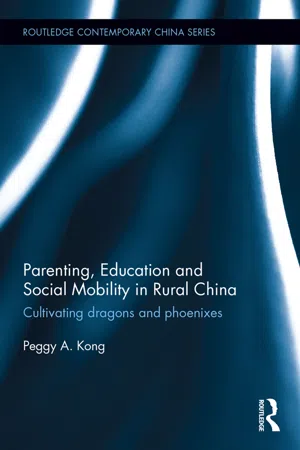
Parenting, Education, and Social Mobility in Rural China
Cultivating dragons and phoenixes
- 140 pages
- English
- ePUB (mobile friendly)
- Available on iOS & Android
Parenting, Education, and Social Mobility in Rural China
Cultivating dragons and phoenixes
About This Book
Like many countries around the world, China has been implementing policies aimed at improving parent-school relationships. However, unlike many developed countries, the historical context of family-school relationships has been limited and parents typically do not participate in the school context. Until now, there has been little research conducted in rural China on parental involvement in their children's education.
This book investigates the nature of parental involvement in primary children's education in rural China by using a combination of quantitative and qualitative methods. It outlines the layered strategies of how rural parents are involved in their children's schooling, showing that rural parents strongly desire educational success for their children and view education as a means to their children gaining social mobility. It demonstrates that few rural parents engage in visible forms of parental involvement in their children's schools, such as attending parent-teacher meetings. Rather, they are more likely to engage strategies to support their children's education which are largely invisible to schools. It adds to the growing body of parental involvement research that suggests that culture, location, and socio-economic status influence different forms of parental involvement, and highlights nuances in invisible forms of parental involvement.
Providing insights into how poor rural parents envision their role with their children, schools, and the larger society, and how these relationships can affect the social mobility of students and families, this book will be of huge interest to students and scholars of Asian education, comparative and international education, and Chinese society.
Frequently asked questions
Information
Table of contents
- Cover
- Half Title Page
- Series
- Title Page
- Copyright Page
- Contents
- List of figures
- List of tables
- Acknowledgements
- Introduction
- 1 Parental involvement and social class in China: conceptual and theoretical framework
- 2 What it means to be “rural”
- 3 Parental hopes and desires
- 4 Student’s role in their own success
- 5 Active rural parents’ hidden work: creating a good learning environment
- 6 Information network: support of family and friends
- 7 Migration for education
- Conclusion
- Bibliography
- Index